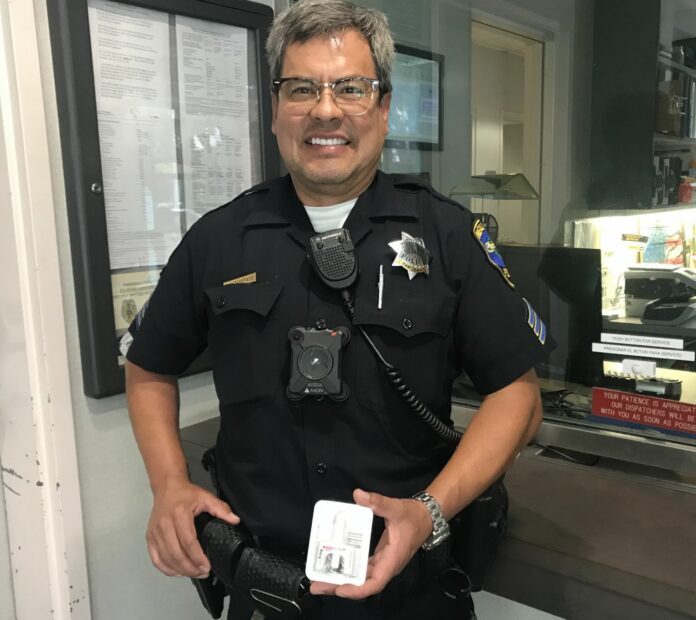
(Editor’s Note: This article has been updated with corrected figures about the number of deaths from opioid overdoses in Sonoma County and California.)
According to the Sonoma County Department of Health Services, someone in Sonoma County dies every eight days due to an accidental drug overdose, so as a way to combat this startling statistic, the Healdsburg Police Department completed training earlier this summer on how to use Narcan, a medication that can reverse the effects of an opioid overdose.
Healdsburg Police, the Rohnert Park Department of Public Safety and Petaluma Police are now the only public safety agencies in the county to carry the life-saving drug, despite a noticeable uptick in opioid addiction and overdoses throughout the area and the state.
Opioid medications, which come in a liquid and tablet form, are often used to treat acute pain following an accident or surgery, but taken outside a hospital setting, they can easily lead to physical dependence. There were 399,240 opioid prescriptions filled in Sonoma County in 2017, according to the California Department of Public Health (CDPH).
According to CDPH statistics, in 2017, there were 26 opioid-related deaths in Sonoma County (5.1 deaths per 100,000 people), which is slightly higher than the state average of 4.8 opioid-related deaths per 100,000 people. (Statewide, in 2017, there were 1,882 deaths due to opioid-related overdoses.)
Nationwide, the Centers for Disease Control say 115 people die everyday from an opioid overdose.
The figures are drastically less grim for the City of Healdsburg, as Healdsburg Chief of Police, Kevin Burke, says in the four months officers have been carrying Narcan, they have not yet had to use it.
“We’ve been watching this national trend in overdoses make its way to the west over the years,” Burke said. “Opioids are really dangerous, and even though we haven’t encountered them here in Healdsburg, we thought we should acquire the kits to hopefully save a life in the event of an overdose.”
Burke explained that having Narcan, which comes in the form of a nasal spray, is also a good safety measure for officers who can get exposed to Fentanyl, another highly addictive pain medication that can easily become airborne.
Narcan, also known as Naloxone, reverses the side effects of an overdose by reaching receptors in the brain.
“There are receptors in the brain for opioids and it (Narcan) competes with those receptors and reveres the action of the opioids,” says Walt Maack a former Healdsburg emergency medical doctor whose son suffered from a drug overdose and died last year.
According to Maack, the Narcan can work in a matter of minutes to reverse the reaction and wake the person up.
“Hopefully that would be the trigger for getting long-term help,” Maack said, who is now working to develop a program in honor of his son that would try to prevent people from overdosing with milder drugs that have less severe symptoms of withdrawal.
Maack said finding people long-term help and making people more aware of the use of Narcan is really the “holy grail” of what he and his wife are advocating for. He also mentioned that it’s great to have seen Healdsburg Police taken steps to be trained in the use of the drug.
Officers were trained in late May by regional EMS staff, who gave the department information on how the drug works and when it should be administered to a patient.
“They gave us a good sense of when and how to administer it, what to expect and what the side effects could be,” Burke said.
So why don’t other county agencies use this handy, life-saving tool? Windsor, Sebastopol and Cloverdale police officers do not carry the kits, nor does the local CHP or county sheriff.
For many smaller police departments, the kits themselves and the training can be costly; however, west county departments, such as Sebastopol Police, said they are interested in using the Narcan packages.
“Petaluma is using it and Rohnert Park started the program, so now it is something we are looking into,” said Sebastopol Chief of Police, James Conner.
And while the CHP does receive calls from time to time regarding opioid overdoses, CHP Santa Rosa Unit Press Information Officer, Kimberly Lemons, says highway patrol officers do not carry kits because their shelf life would quickly decline in patrol cars.
“We spend so much time in the car that the shelf life would diminish … If a CHP dispatcher got an opioid overdose call then it would go out to Redcom dispatch (a joint powers authority in Santa Rosa that provides fire and EMS dispatch to emergency response agencies throughout the county) and or the sheriff’s department,” Lemons said.
Sonoma County Sheriff deputies also do not use the kits for the same reasons according to Sgt. Spencer Crum.
“The sheriff’s office would only go to an overdose call if it’s deemed intentional to commit suicide. Routinely an overdose call is transferred to Redcom dispatch and handled by ambulance and fire departments as a medical call,” Crum said, who mentioned that county ambulance staff are all trained and certified to administer the drug.
As for the Healdsburg Police Department, Burke says he is glad officers will be able to provide care to people experiencing an overdose.
“This was a no-brainer. We wanted it (the kits) sooner rather than later and the last thing I want is for an officer to be helpless. Why wait?” Burke said.
For those who are interested in receiving training to administer Narcan, California Northstate University College of Pharmacy will host a free training session Saturday, Sept. 15 where they will give away kits to the first 65 attendees.
The session will cover how the drug works and how the California Good Samaritan Law can protect bystanders who provide aid. The health fair runs from 11 a.m. to 3:30 p.m. at the Cloverdale Citrus Fairgrounds, 1 Citrus Fair Dr. in Cloverdale.








